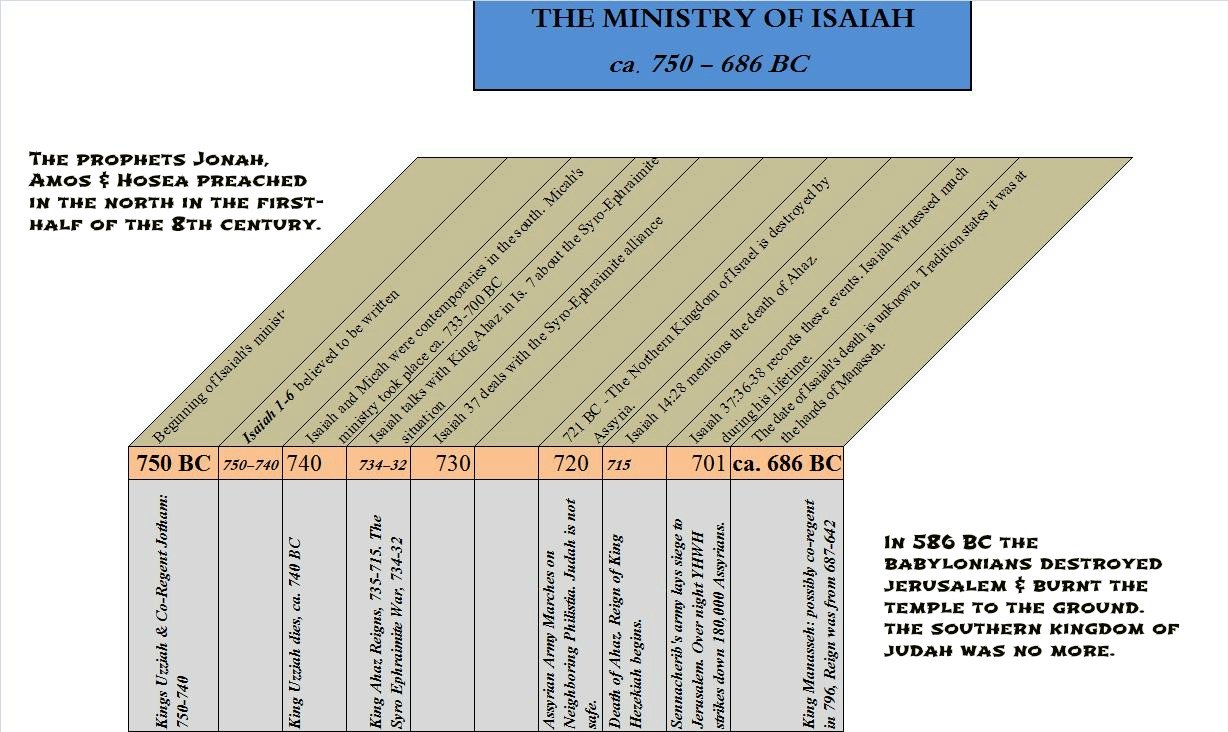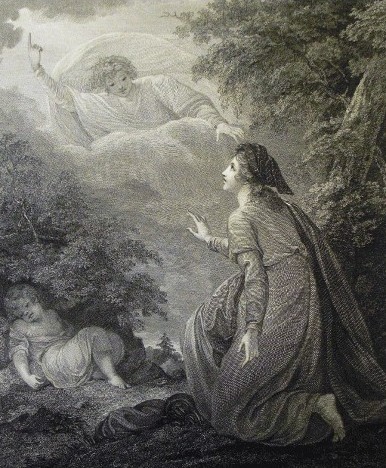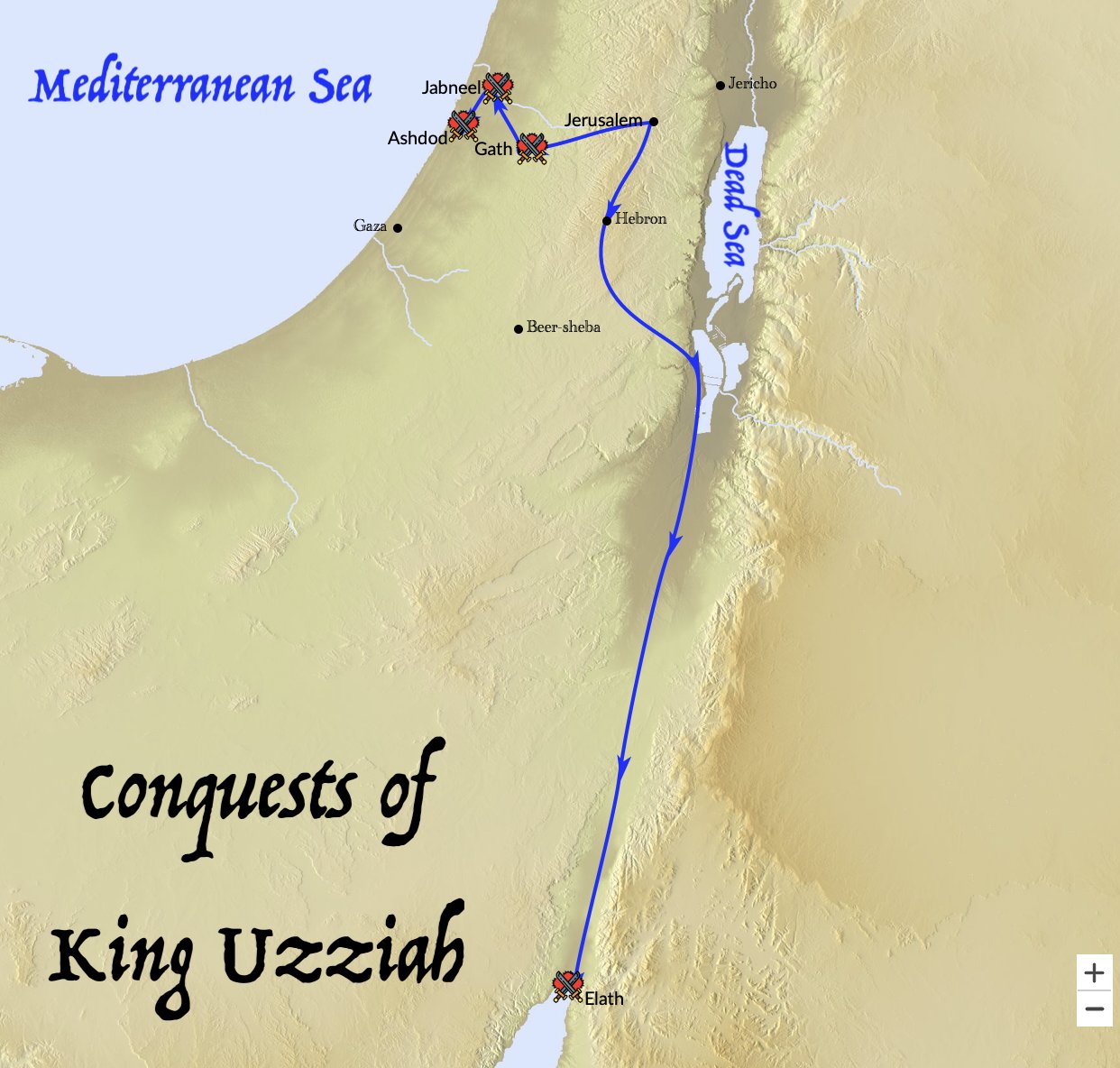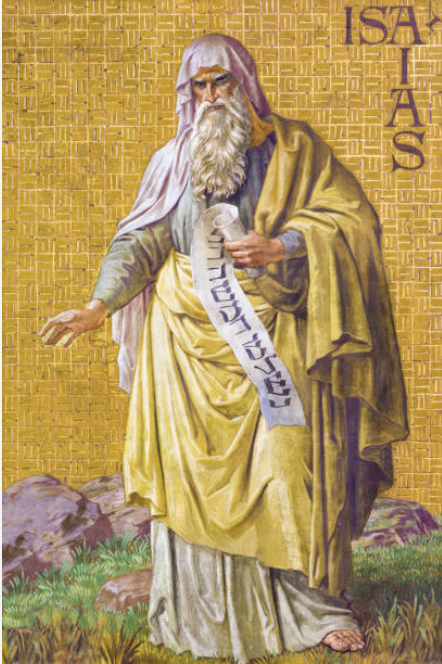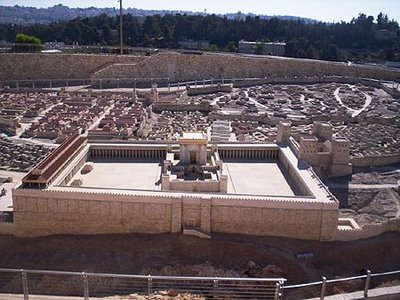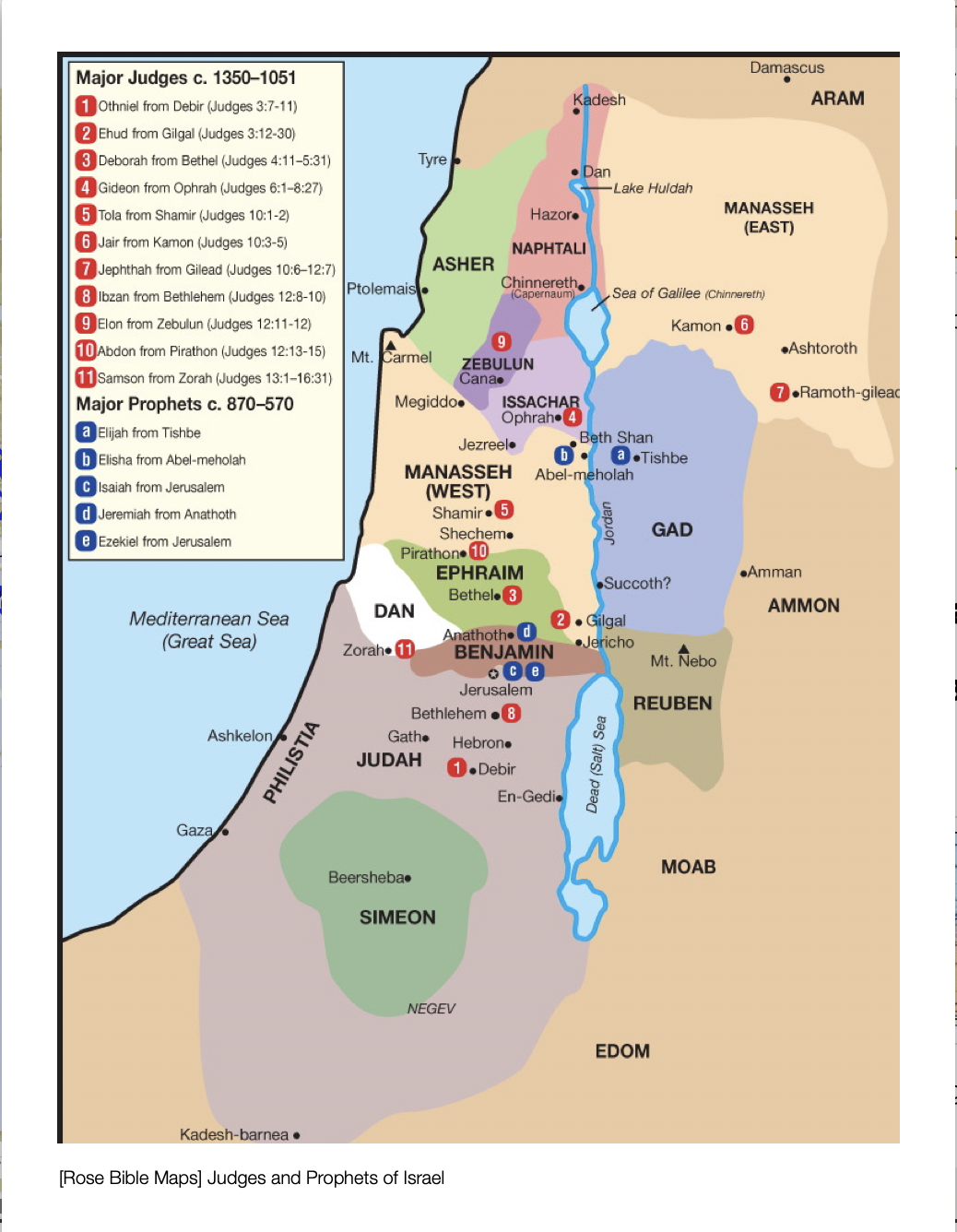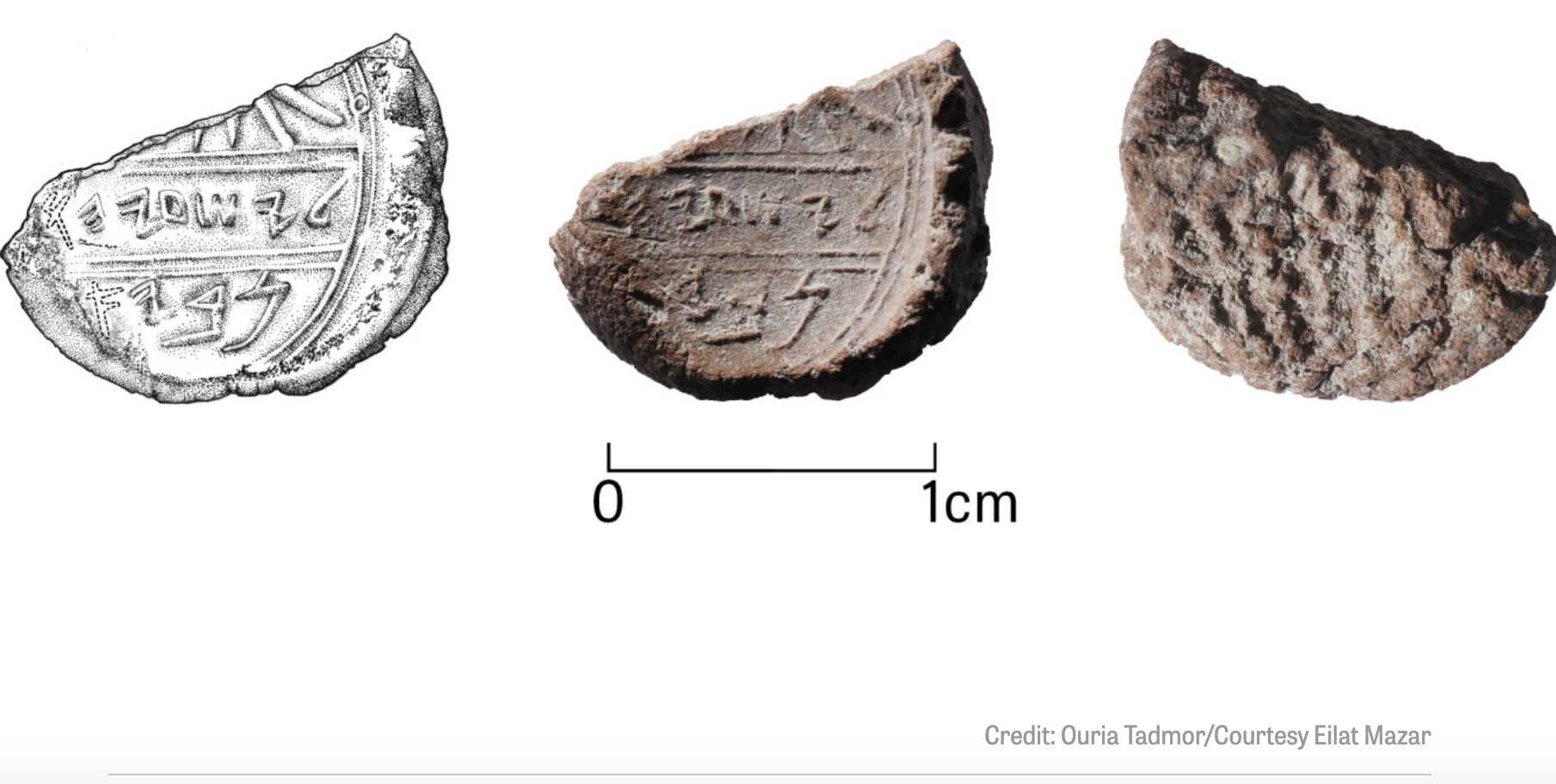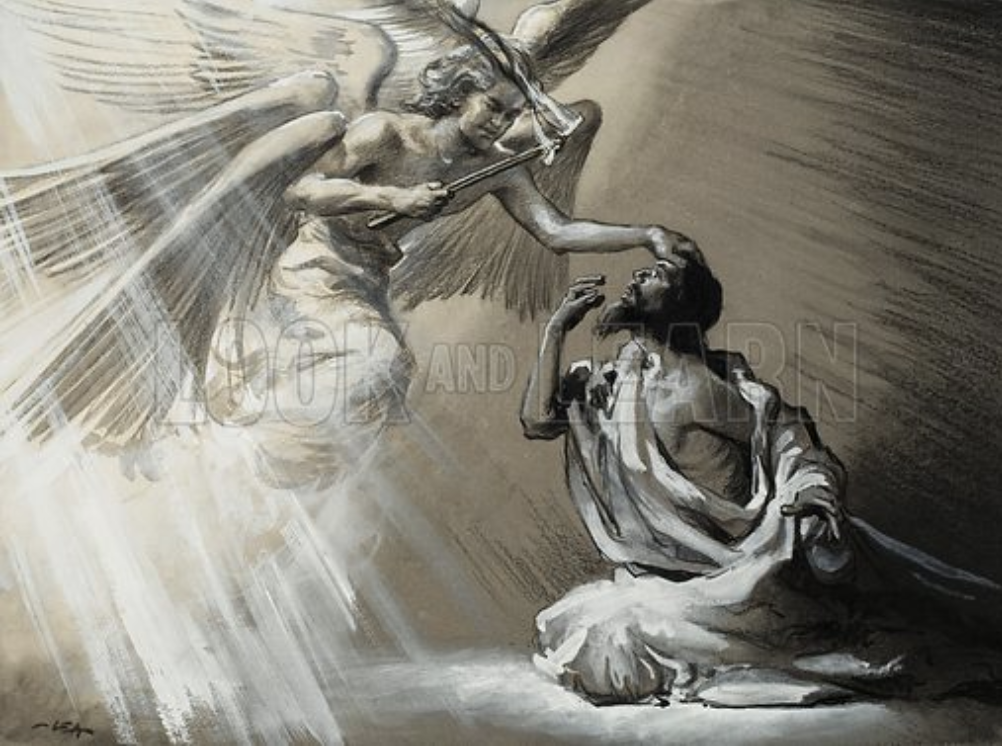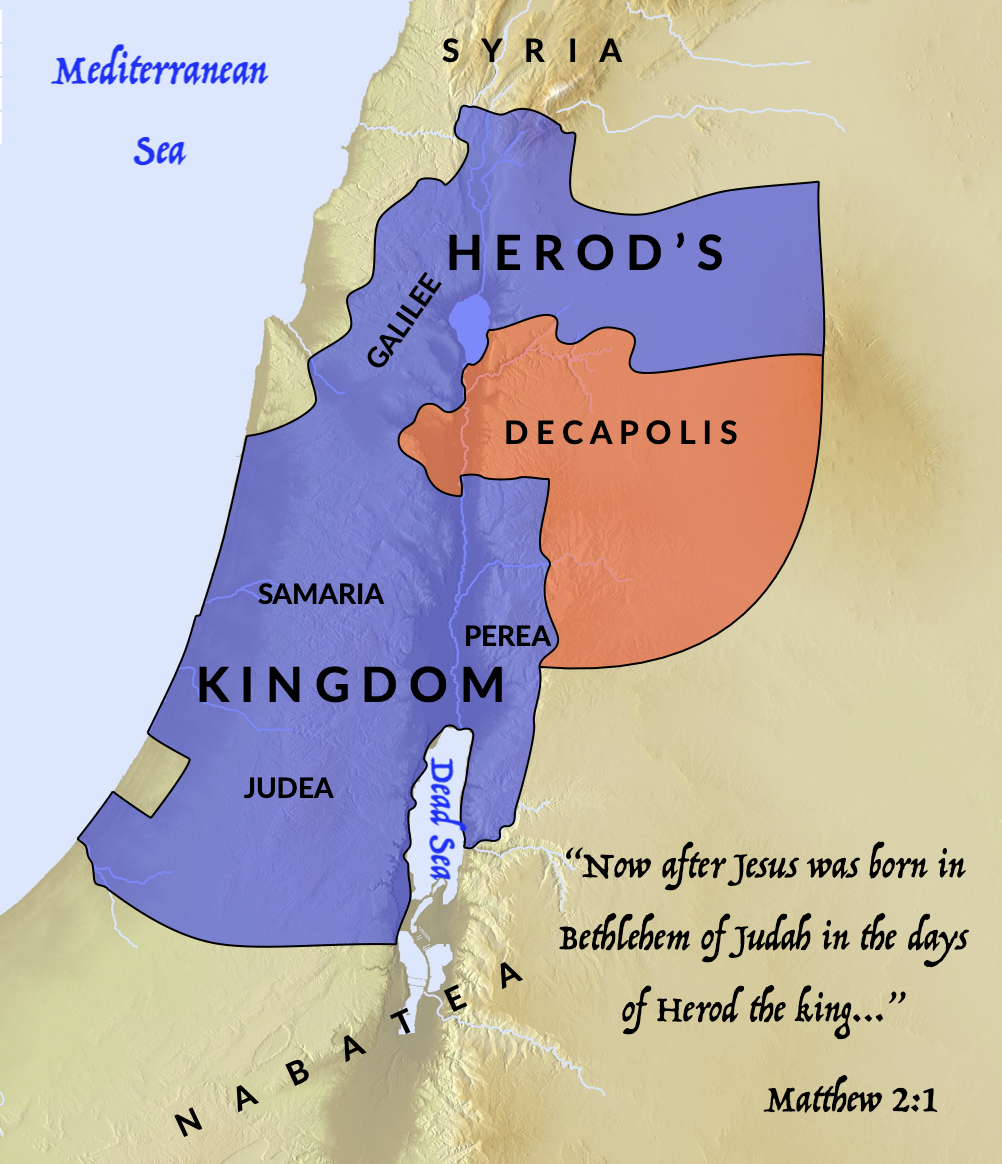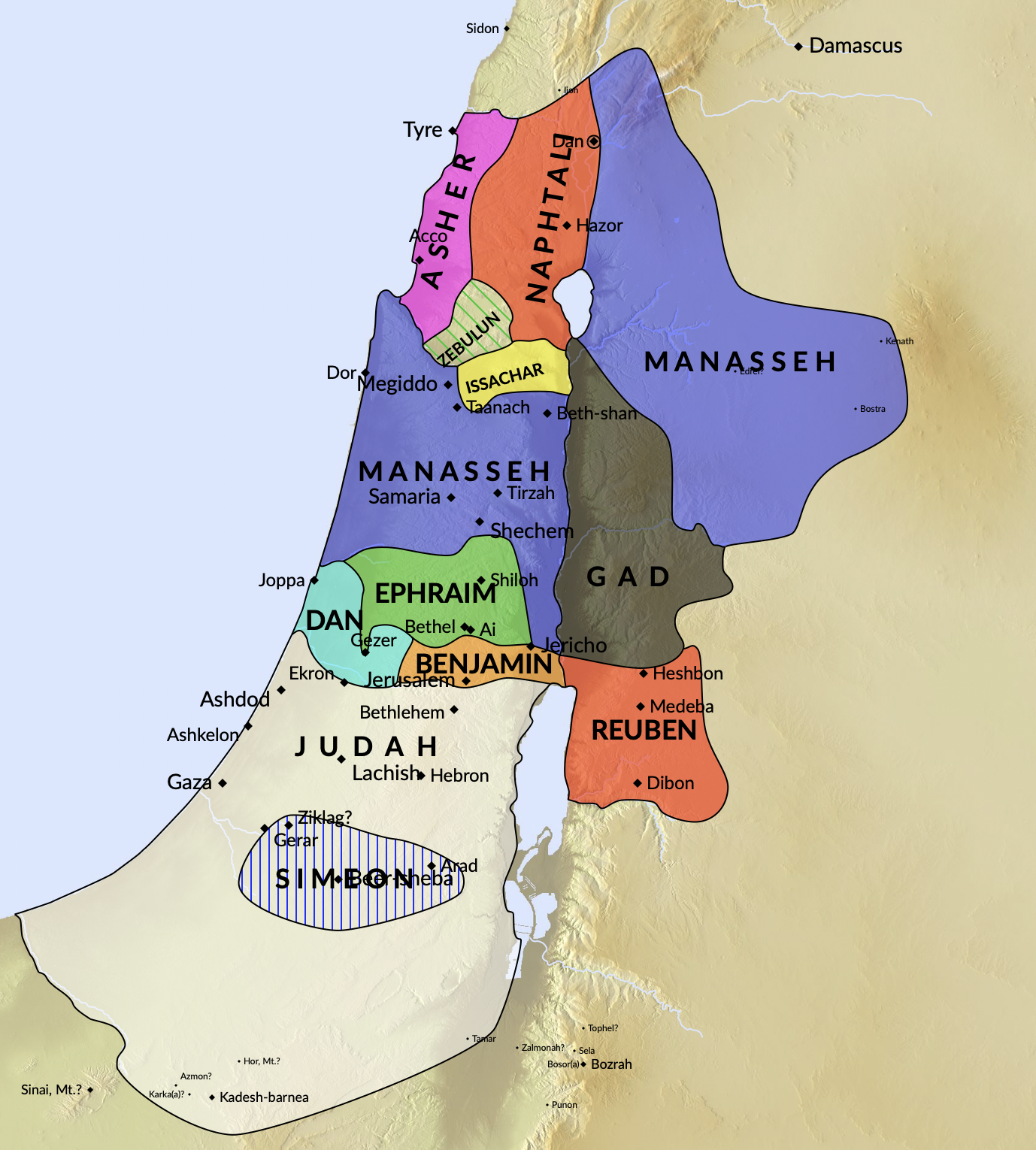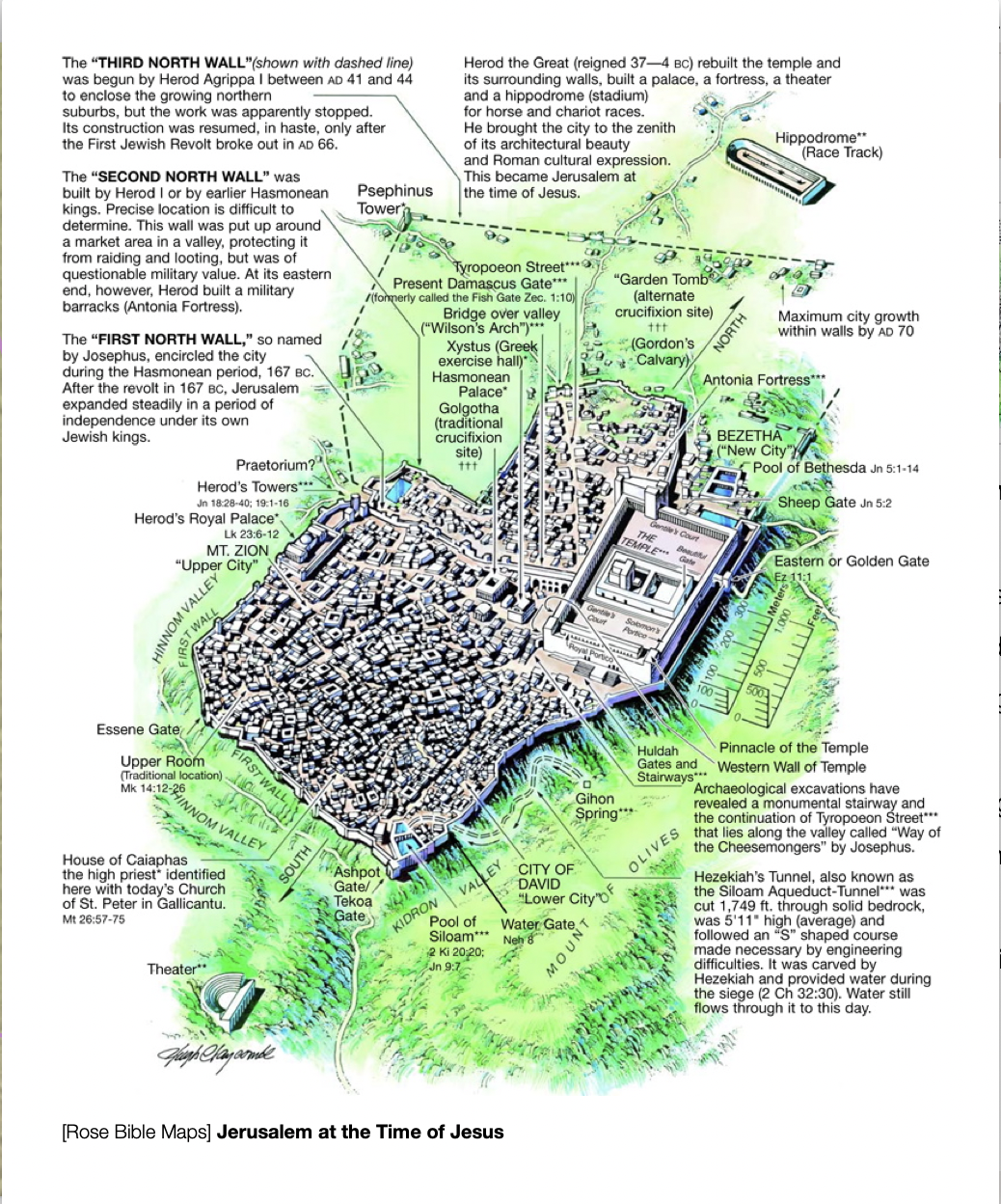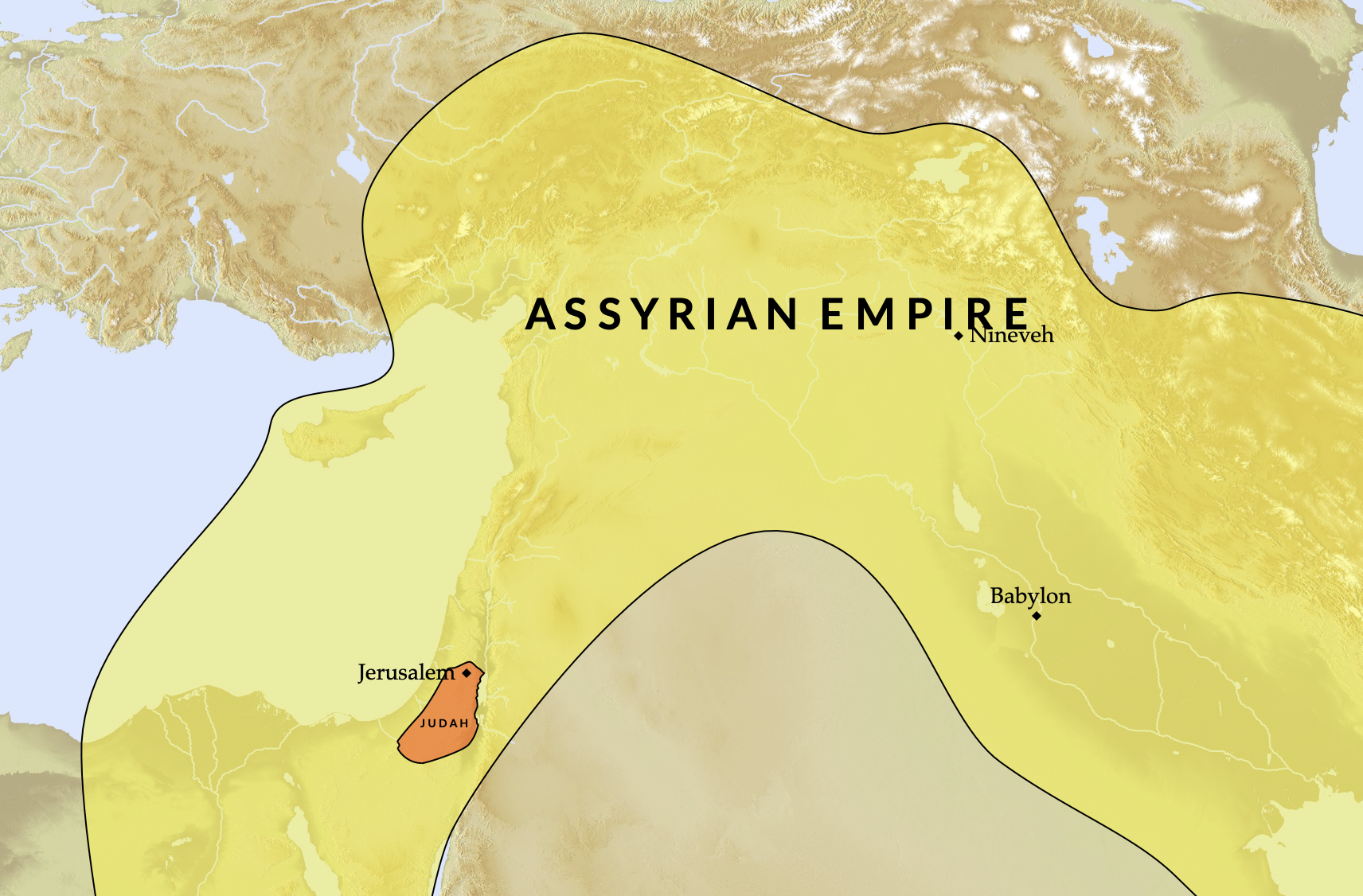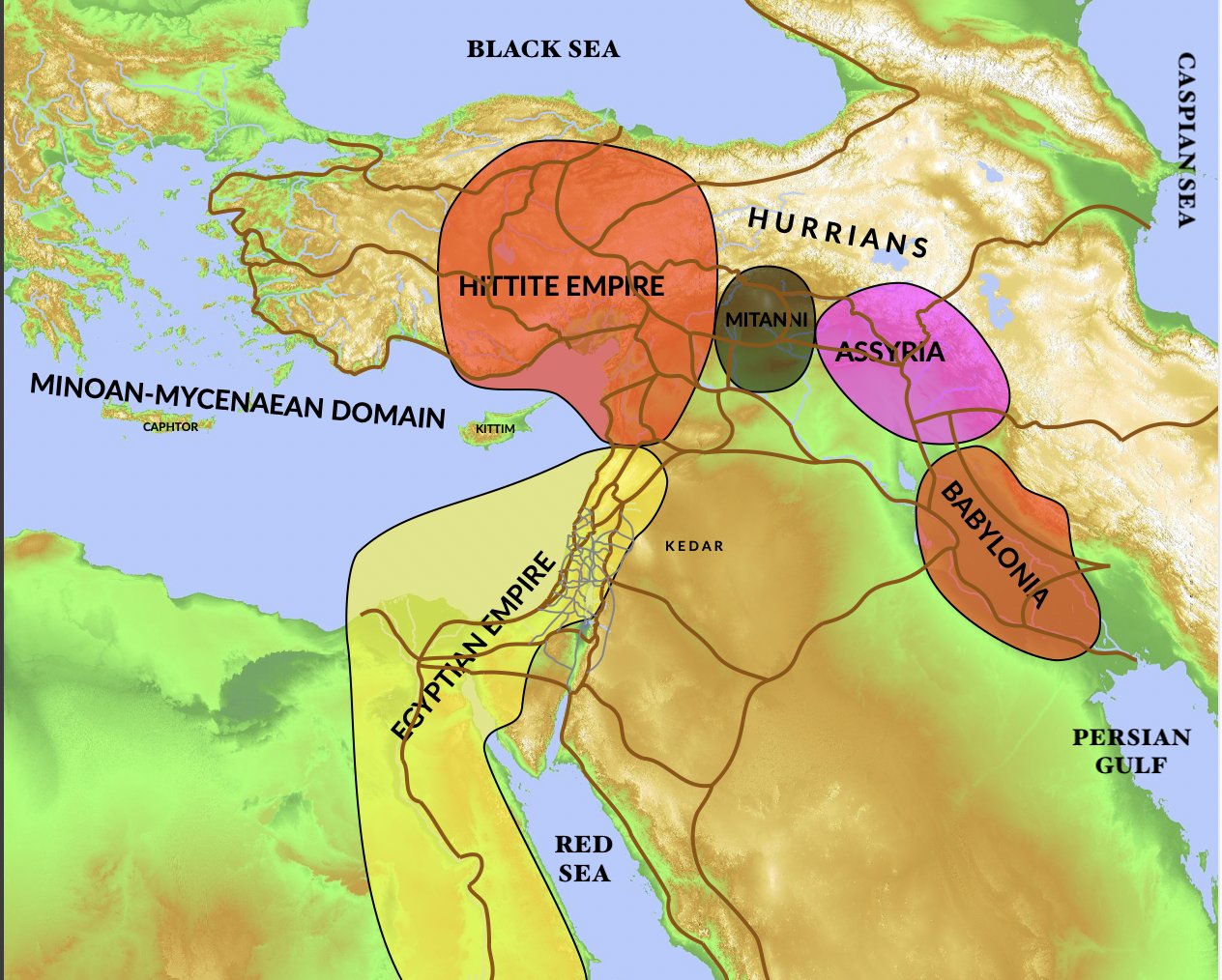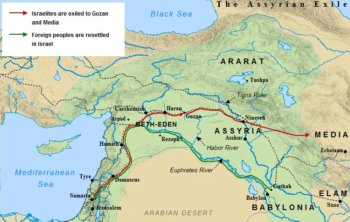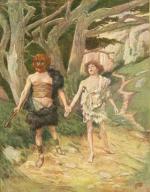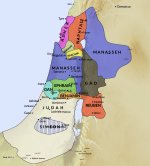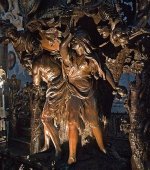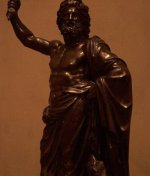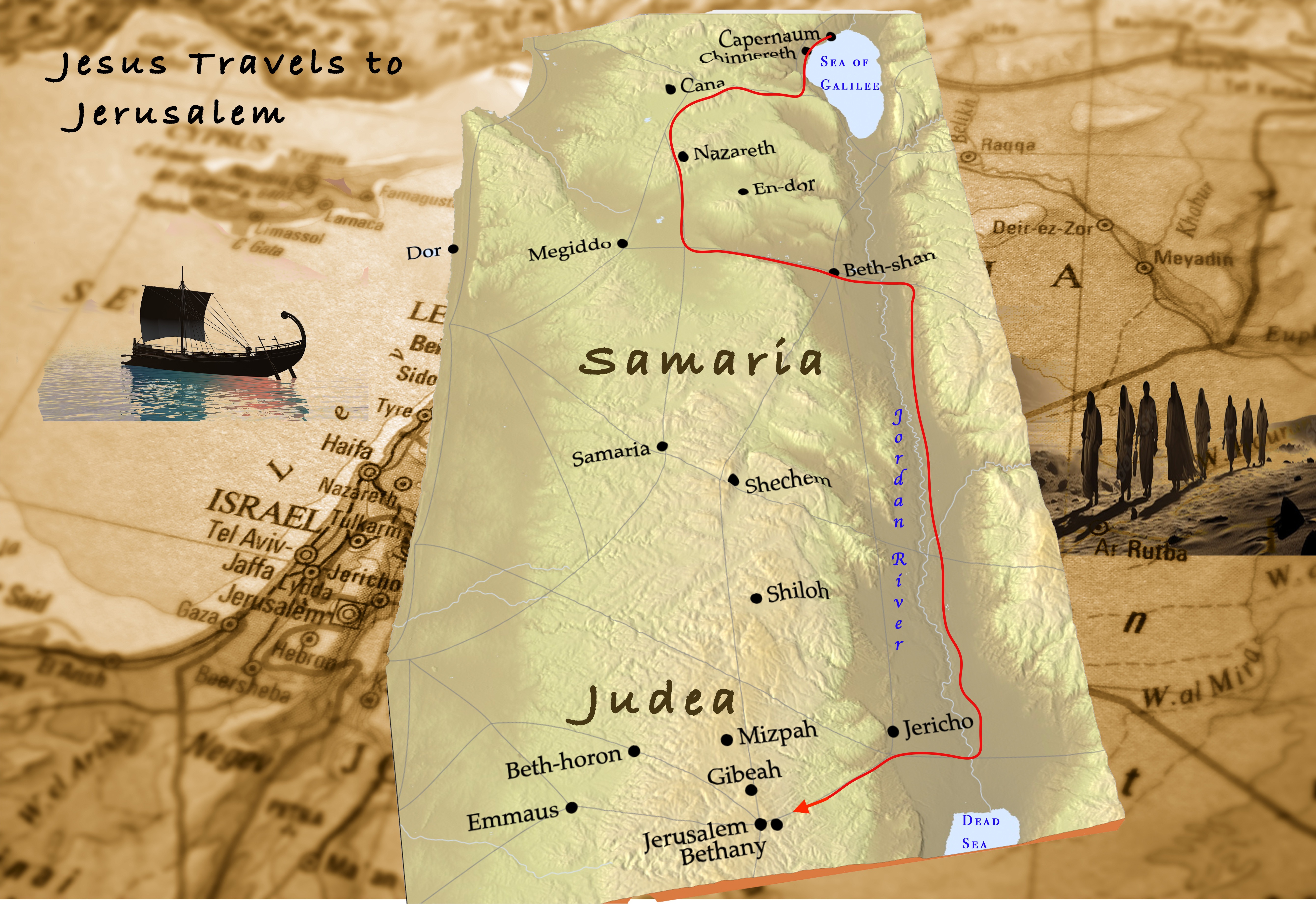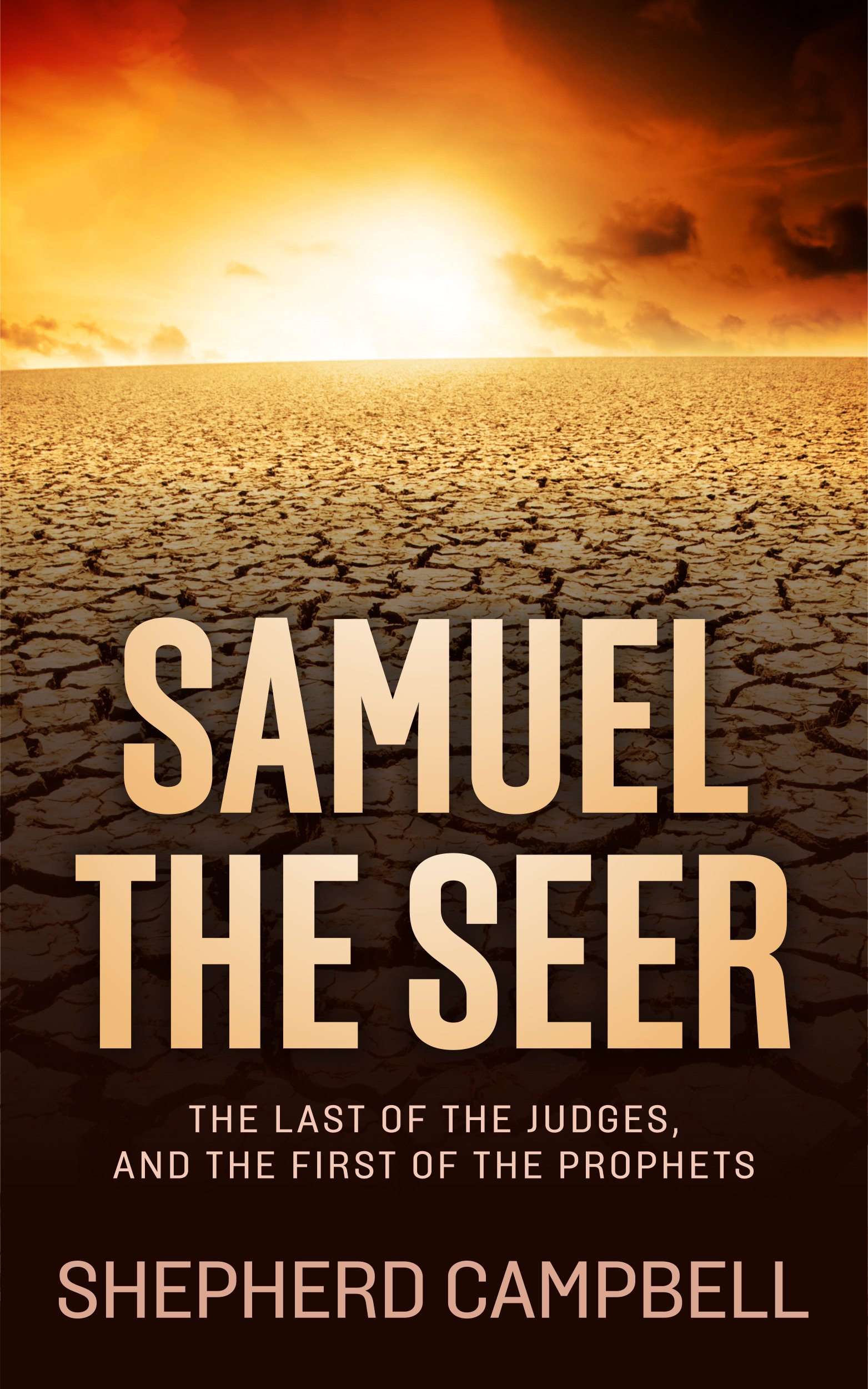- Biblical Maps
- Home Page
- History of Israel Blog
- Ancient Mesopotamia
- Map of Palestine
- Abraham
- Ancient Israel
- 12 Tribes of Israel
- Jerusalem
- The Book of Isaiah
- Palestine
- The Habiru
- Contact Us
- Bible Study Forums
- Media Page
- Visitors Sitemap
- Privacy Policy
- The History of the Old Testament
- In the Days of Noah
- The City of Jericho
VISIT OUR FACEBOOK PAGE!
ISAIAH 6
Length: Isaiah 6 is 13 verses long. It is one of the shortest chapters in Isaiah, which is itself one of the ten longest books of the Bible. Isaiah 4 is the shortest in length, with only 6 verses.
Date: Isaiah 6 provides a clear marker for the date of Isaiah's vision and this chapters likely composition. Verse 1 states: "In the year of King Uzziah's death...". The significance of this moment must be understood - for Uzziah had reigned for forty years, ushering in stability and prosperity. He was greatly loved by those in Judah and Jerusalem, including Isaiah.
Some scholars have suggested the two may have been related, evidenced by the similarity in the -iah ending of each's name. The year was 740 BC - and it marked a turning point in Judah's history. It was also to be a watershed year in the life of Isaiah the prophet.
Structure: Isaiah 6 is one of the most crucial chapters in Isaiah. It marks not only a drastic turning point in the history of Judah, but also a very significant time in Isaiah's life. The NASB calls Isaiah 6, Isaiah's Vision. Isaiah has a vision in which he sees God. Like many books in the Bible, Isaiah 6 carries with it controversy surrounding its true nature. Some view this as a restatement of Isaiah's initial call by God - thus they argue it is out of place because it is not in chronological order. Others, which is the stance of this website, believe it to be a "recommissioning", as Gary Smith calls it, from Isaiah's inaugural call in chapter 1. Chapter 6 recommissions Isaiah for "a specific historical task" God had in mind for His prophet. It depicts a fascinatingly mysterious glimpse of God in heaven, and of the mysterious Seraph which hovered around God's throne.
CLICK ON A LINK BELOW TO VIEW THAT VERSE.
vs. 2-3
v. 5
vs. 6-7
v. 8
vs. 9-10
vs. 11-13
ISAIAH 6:1
"In the year of King Uzziah's death, I saw the Lord sitting on a throne, lofty and exalted, with the train of His robe filling the temple."
Isaiah immediately opens up Isaiah 6 with a bombshell. He says he saw God. This, of course, would've sounded mad to the Jews of Isaiah's day. Moses was the only man to have spoken "face to face" with God (Ex. 33:11), yet here is Isaiah claiming to have seen Him sitting on His throne.
It was widely believed that to see God meant death. Numerous passages in the Bible suggest this to be true, yet allow for individuals to be granted this most unique of privileges.
Hagar was the first woman in the Bible to see God since Eve in Genesis 16:13. However, her expectation, like Isaiah, was that she should have perished.
"Then she called the name of the Lord who spoke to her, 'You are a God who sees,'; for she said, 'Have I even remained alive here after seeing Him?'"
Hagar was visited by the Angel of the Lord in the wilderness as she fled Sarai harsh treatment. This would suggest perhaps Hagar was allowed to see His angel. Many have taken Hagar's vision as a vision of the preincarnate Christ - depicted in the OT as the Angel of the Lord.
God Himself speaks to Moses in Exodus 33:20 and flat out states no man can see Him and live.
"But He said, 'You cannot see My face, for no man can see Me and live!'"
That visionary apostle John realized this as well, and recorded his thoughts on the matter in John 1:18.
"No one has seen God at any time; the only begotten God who is in the bosom of the Father, He has explained Him."
Yet the Bible also tells us specifically Moses did, in fact, see God face to face (Ex. 33:11; Numb. 12:8; Deut. 34:10). It is undeniable that Isaiah intended to convey he had seen THE God, Yahweh, God of Abraham, God the Father.
The Hebrew word Isaiah used was, ADONAI, translated as "Lord" and used ONLY as THE proper name for God. In this way there is never any doubt about who is being referred to when the appellation Adonai is used. As Zodhiates states, when the literal name of YHWH was used, it was never uttered, thus Adonai was substituted in place.
Zodhiates states Isaiah was in the Temple precincts when he was "permitted to see the Lord in some unspecified manner" (NASB, p. 903). Holman's Bible Commentary on Isaiah makes the suggestion Isaiah may have been a Temple priest at some point in his life. Indeed Isaiah does have access to both the Temple, and as is seen later with Hezekiah, the royalty and elite of Judah.
It has already been noted his connection with Uzziah, if not in name only perhaps as family. For these reasons Isaiah seems to have been born to the upper class of Jerusalem, yet as will be shown, willingly gave up his place to serve God.
It is imperative to take note of what Isaiah saw, and what he didn't see in verse one. We are told he saw God sitting on His throne. The adjectives "lofty" and "exalted" are used in connection with God's throne, thus suggesting the throne was raised perhaps, or highly elevated in some way. It is a throne which would surely reflect the lofty and exalted status of its occupant - God the Creator.
The Hebrew term used to designate His throne is KICCEH. It literally translates as; covered, i.e., a throne ( as canopied), seat, stool, throne. Zodhiates points out it occurs 136 times in the Hebrew OT and every time refers to a seat of honor (NASB, p. 1735). The overwhelming majority of these references are in conjunction with David, Solomon, or God Himself.
It is interesting to attempt a picture of God's throne off of the little information we have from Isaiah. It is possible, based on the Hebrew word, Isaiah saw God sitting under a canopied throne of some sort. It was certainly a Kingly throne, one of majesty and was highly elevated, as Isaiah claims it "lofty and exalted".
Isaiah also saw the hem of God's robe completely fill the Temple. In what ways, or to what extent is left unsaid. In fact, more is left to the imagination than is detailed in verse 1. However, one can only the images Isaiah witnessed. Gary Smith put it best; "the mystery of the divine majesty in the vision was probably so otherworldly that it was difficult to find adequate words to describe God's glory in human terms."
The point is God is high and lifted up, lofty and exalted, raised above His creation as He should be. John uses this passage from Isaiah to show how Jesus fulfilled the OT prophecies concerning the Messiah. In John 12 Jesus is foretelling His death to the multitudes. John uses their disbelief in Him as evidence of the fulfillment of Isaiah 53. John referenced Isaiah's vision in John 12:41.
"These things Isaiah said, because he saw His glory, and he spoke of Him."
Others in the Bible have had visions of God's throne as well. These descriptions, taken with Isaiah 6, provide fascinating insight into the Heavenly and Divine realm.
John saw God sitting on a throne in Revelation 4:2-3. God appears as a "jasper stone and a sardius". There was also a rainbow around the throne itself, "like an emerald in appearance".
In I Kings 22:19 Micaiah sees "the Lord sitting on His throne and all the host of heaven standing by Him on His right and on His left". Notice "the host of heaven" - a group frequently mentioned in the Bible.
Job 1:6 may shed some light on the host of heaven.
"Now there came a day when the sons of God came to present themselves to the Lord, and Satan also came among them."
Apparently the host of heaven consisted of the angels in the heavenly realm; and Satan also had access to the Lord's court. Other references to the host of heaven can be found in Job 2:1, Psalm 103:20-21, Daniel 7:10, Matthew 18:10, Hebrews 1:7, 14 and a host of other verses.
The prophet Ezekiel also had a profound vision of God's throne in Ezekiel 1:26. Ezekiel writes; "...above the expanse...there was something resembling a throne, like lapis lazuli in appearance, and on that which resembled a throne..."
Ezekiel uses the same Hebrew word to describe God's throne as Isaiah. In most of the Church's art depicting God's throne it is in the traditional sense of Western imagery. Throne's vary from culture to culture and period to period. In reality nobody knows what God's throne will look like, but the prophets give us fascinating glimpses.
Perhaps the most interesting book in the Bible is the book of Daniel when it comes to angelic encounters, visions and dreams and apocalyptic prophecies. Daniel encountered God's throne in Daniel 7:9.
"I kept looking until thrones were set up, and the Ancient of Days took His seat; His vesture was like white snow, and the hair of His head like pure wool. His throne was ablaze with flames. It's wheels were a burning fire."
Daniel's throne had wheels! The actual meaning of the Hebrew word is a debated topic, as is the exact meaning of this phrase concerning God's throne. The Hebrew, ROUTIS, can imply a whirlwind, dust, heaven, a rolling thing, or a wheel.
Another unique aspect of Daniel's vision of God's throne is there are multiple thrones, of which God's - called the Ancient of Days - is the main one. This corresponds with John's vision in Revelation 4 of the 24 thrones surrounding God's main throne.
God's throne was not the only thing Isaiah was blessed to encounter. He also saw beings surrounding God's throne. These beings he identified in verse two as Seraphim.
ISAIAH 6:2-3
" 2 Seraphim stood above Him, each having six wings; with two he covered his face, and with two he covered his feet, and with two he flew. 3 And one called out to another and said, 'Holy, Holy, Holy is the Lord of hosts, the whole earth is full of His glory.' "
The Seraphim in Isaiah 6 are very mysterious creatures. Isaiah is perhaps one of only two people to have ever encountered them in a vision - with John being the other. Indeed Isaiah's description of the Seraph is similar to the description John gives in Revelation 4:8.
"And the four living creatures, each one of them having six wings, are full of eyes around and within; and day and night they do not cease to say, Holy, Holy, Holy is the Lord God, the Almighty, Who was and Who is and Who is to come."
Isaiah's Seraph says much the same thing as John's; and both have six wings, so it is a reasonable assumption they are the same beings surrounding God's throne.
Seraph is the actual Hebrew term used to denote these beings. It comes from a word which means, to be on fire. SERAPH conveys the ideas of; burning, fiery, poisonous, serpent. Holman's Bible Commentary on Isaiah states Seraph "basically means 'the fiery ones'" (p. 68). It also points out a related Hebrew word means "fiery serpents".
It is a foreboding word which depicts a powerful being serving in the presence of God. They were present when the heavenly host convened, possibly keeping out unwanted guests. So rare and mysterious is the creature it only appears twice in all of the Bible (and only once by the name Seraph) - Isaiah 6 & Revelation 4.
Isaiah's vision was rare and powerful. He saw God, God's throne and court, and the Seraphim which surround His throne. Isaiah immediately realized he was in imminent danger, and in Isaiah 6 :5 cries out for his life.
ISAIAH 6:5
"Then I said, 'Woe is me, for I am ruined! Because I am a man of unclean lips, and I live among a people of unclean lips; for I have seen the King, the Lord of hosts.' "
Isaiah not only recognizes his own unworthiness and sin, but also the sin of his people and nation Israel - thus he fears he will instantly be struck dead. Isaiah realizes his humanity and corruption, and knows sin cannot coexist with God, nor can it enter the heavenly realm. However, like Satan in the example from Job earlier, Isaiah was allowed to enter the presence of God.
Exodus 33:20 states no man can see God and live.
"But He said, 'You cannot see My face, for no man can see Me and live!'"
It is reasonable to assume Isaiah was well versed in the books of Moses, thus was familiar with this passage from Exodus. This would explain why he immediately fears for his life and admits his filth before the Creator. Isaiah is keenly aware sin cannot coexist with God, hence his exclamation "I am ruined!".
Compare Isaiah's response to Peter's in Luke 5:8.
"But when Simon Peter saw that, he fell down at Jesus' feet saying, 'Go away from me Lord, for I am a sinful man!'"
Peter said these words after they had been fishing all night without catching anything. Jesus urges Peter to push out, "and let down your nets for a catch". Peter, probably a bit annoyed that Jesus wanted to go fishing now after they had been at it all night, complains about their lack of fish from the previous night's work. Nonetheless, Peter agrees and goes fishing with Jesus. They caught so many fish "their nets began to break".
Peter, like Isaiah, recognized his unworthiness in the presence of the Divine. In Isaiah 6, though, the prophet also recognizes the guilt of the nation Israel. His personal guilt lies in the simple fact he has seen God.
Hans Wildberger believe the phrase "I am ruined" was better translated as, "I must be quiet." Wildberger's argument stemmed from the fact Isaiah mentions his unclean lips in the very next sentence, and the two Hebrew words which mean "to be silent" and "to destroy, ruin" are nearly identical. The meaning of Isaiah 6 is not altered with one interpretation or the other.
The translation "I must be quiet" would also make sense. Isaiah claimed he must be quiet and not speak because of his unclean lips and the lips of Israel in the presence of the Divine. Gary Smith argues this translation is possible and makes sense, but is not the best interpretation based on Hebrew grammar.
Regardless, Isaiah 6 uses the unclean lips of Isaiah and Israel to represent the sin which emanates from the unclean heart. Unclean lips and impure hearts are symptoms of the same sickness - sin. Jesus speaks of unclean lips and impure hearts in Matthew 15:18.
"But the things that proceed out of the mouth come from the heart, and those defile the man."
What's important to take from this verse in Isaiah 6 is the prophet takes the most important and necessary first step of admitting his sinfulness, and openly confessing it before God. Psalms 15:1-2 tells in clear language who is allowed in God's presence.
" 1 O Lord, who may abide in Your tent? Who may dwell on Your holy hill? 2 He who walks with integrity, and works righteousness, and speaks truth in his heart."
Isaiah was speaking truth from his heart, confessing both his and Israel's uncleanness. Isaiah 59 lists a multitude of sins the nation Israel was guilty of during the ministry and lifetime of Isaiah. So wicked were the Jews, Isaiah says "we grope along the wall like blind men". Isaiah 6 is a warning of what happens when one gropes along the wall for too long. Sooner or later God punishes the guilty and uses the consequences to hammer home His point.
It is also interesting to note Isaiah, though not told, knew instinctively who he was beholding. He immediately recognized the presence of God. The appellation "Lord of hosts" is a fascinatingly mysterious designation used here and throughout the OT for God. Jeremiah uses this name in Jeremiah 46:18..
"As I live,' declares the King whose name is the Lord of hosts..."
Who is His host? We know of the angles and the different hierarchy or types of angels from the Bible. Satan, in Job, is allowed to enter into His presence. In short, the "host" were the angelic beings and any other beings He allowed into His throne room. By extension, His host is all of His creation.
ISAIAH 6:6-7
" 6 Then one of the Seraphim flew to me, with a burning coal in his hand which he had taken from the altar with tongs. 7 And he touched my mouth with it and said, 'Behold, this has touched your lips; and your iniquity is taken away, and your sin is forgiven."
In this fascinating account of man encountering a divine angel, the Seraphim performs a number of tasks that can only be performed by God. In this case it seems God has authorized the Seraphim to perform these tasks on His behalf.
The first thing the Seraphim does is fly towards Isaiah with a burning coal. The angel places the burning coal on Isaiah's mouth. Recall Isaiah's previous statement about his unclean lips, which amounted to a confession of his sin. Immediately God responds by sending His emissary to purify Isaiah, thus allowing him to remain in the heavenly realm.
Once the coal touches Isaiah's lips, he is pronounced clean and forgiven. This is a fascinating exchange for the angel actually says that Isaiah's sins are forgiven! Only God, and later His son Jesus, could do this. Yet God demonstrates His strength here by using one of His angels to forgive Isaiah's sins.
Jesus speaks to this phenomenon of God imparting His power in the New Testament. Jesus was repeatedly pelted with questions regarding where He obtained His authority (Mark 11:28/Matthew 21:23). Jesus directly addressed their questions in John 5:30. This verse can also be applied to the Seraphim forgiving Isaiah's sins.
"I can do nothing on My own initiative. As I hear, I judge; and My judgement is just, because I do not seek My own will, but the will of Him who sent Me."
Jesus again touches on authority when talking with Pilot in John 19:10-11. Pilot makes the statement he has authority over Jesus. However, in verse 11 Jesus counters Pilot with:
"...You would have no authority over Me, unless it had been given you from above; for this reason he who has delivered Me to you has the greater sin."
Thus God will occasionally impart His power to man, or in the case of Christ, willfully give up His power. In this way the Seraphim is not out of line forgiving Isaiah's sins, as it was clearly a directive given the being by God. A footnote in the Zodhiates NASB points out this phrase in the Hebrew literally means, "atoned for". The Seraphim, by atoning for Isaiah's sin, accomplished for Isaiah what Jesus would later accomplish for mankind.
It is also important to note where the Seraph obtained the coal. He grabbed it from an altar before the throne of God. This angel, thus, could approach the altar that is before God. We see a similar action taking place in the book of Revelation - written hundreds of years later and yet consistent in how they represent the angels around God's throne.
Revelation 8:3
"Another angel came and stood at the altar, holding a golden censer; and much incense was given to him, so that he might add it to the prayers of all the saints on the golden altar which was before the throne."
We see another angel standing before the throne of God performing work related to the function of the altar before the Lord. Thus angels, or at least some of them, are allowed to stand before the altar and perform God's work with the altar.
It is only after Isaiah has been cleansed and forgiven that he can hear, see and talk with God. Isaiah, thus, becomes a parallel for the Christian's relationship with God through Christ. Like Isaiah, our lips are unclean. Like Isaiah, we are unfit to stand before God. Like Isaiah, it is only after the individual accepts Christ that he is able to approach God. Jesus Christ is our Seraphim - for it is He who purifies the believer and atones for their sin.
ISAIAH 6:8
"Then I heard the voice of the Lord, saying; 'Whom shall I send, and who will go for Us?' Then I said, 'Here am I. Send me!'"
A number of interesting elements appear in Isaiah 6:8. First and foremost is the glimpse we get into the divine council's proceedings! The Bible gives us glimpses into the Lord's heavenly court in various passages throughout the Bible, mainly in the Old Testament.
The first question that pops out in verse 8 is the obvious one; who is the "Us" God refers to? A similar phrase is used with the creation of man in Genesis 1:26.
"Then God said, Let Us make man in Our image, according to Our likeness; and let them rule over the fish of the sea and over the birds of the sky and over the cattle and over all the earth, and over every creeping thing that creeps on the earth."
Many Christian scholars have taken the "Us" in Genesis as a reference to the Trinity of God. Similarly, E.J. Young takes the "Us" in Isaiah 6 as suggesting "a plurality of persons...foreshadows the doctrine of the the Trinity".
The extremely influential Walter Brueggemann believed the Isaiah 6 "Us" referred to the royal we - or the royal plural of government. John Oswalt believes it refers to a plural of majesty (Isaiah 1-39, p. 185).
It is interesting to note the word often used to denote God, Elohim, is actually a plural word. Elohim alternately translates as 'God', and 'gods', in the OT depending on the context.
The plurality of God is suggested in numerous OT passages, though perhaps not outright stated as in Isaiah 6 & Genesis. For example, in Genesis 1:1-2 we learn that God created the heavens and the earth. Then in verse 2 we read; "and the Spirit of God was moving over the surface of the waters". The implication here is obvious, that God's Spirit and God were two distinct personalities functioning in two distinct ways.
Again we are given hints of God's plurality in Psalms 104:30.
"You send forth Your Spirit, they are created; And You renew the face of the ground."
In Ezekiel 37 God tells Ezekiel "I will put My Spirit within you", again signaling two distinct personalities with two distinct functions. Isaiah dives deeper into the matter later in Isaiah 48:16 with a fascinating verse on the Trinity.
"Come near to Me, listen to this; From the first I have not spoken in secret, from the time it took place, I was there. And now the Lord God has sent Me, and His Spirit."
It is hard to deny the plurality of God even in the Old Testament. In the New Testament this plurality came to be known as the Trinity - the Father, Son & Holy Spirit.
Jesus spoke of His relationship with God in the NT in numerous passages. So did Paul (Titus 3), Peter (I Pet. 1:2), Jude (Jude 20-21) and many others in the NT spoke of the plurality of God as manifested in His Son, Jesus; and His Spirit left behind by Jesus.
Isaiah 6 also provides fascinating insight into the Divine Council. Isaiah, like Jeremiah, Ezekiel, John and others, was granted special VIP access to a session of the Divine Council in Heaven. The council is headed by God, and only convenes when God deems it necessary. Other passages in the Bible further illuminate God's court in action.
Psalm 89:7
"A God greatly feared in the council of the holy ones, and awesome above all those who are around Him?"
Job 1:6
"Now there was a day when the sons of God came to present themselves before the Lord, and Satan also came among them."
Zechariah 3:4
"He spoke and said to those who were standing before him, saying, 'Remove the filthy garments from him.' Again he said to him, "See I have taken your iniquity away from you and will clothe you with festal robes."
Another interesting exchange occurs between Job and his "friend" Eliphaz in Job 15:8.
"Do you hear the secret council of God, and limit wisdom to yourself?"
The secret council of God is a vibrant and active council in heaven. The council is depicted in Job 1 and I Kings 22 with "the Lord sitting on His throne with the hosts of heaven standing around him" (I Kgs. 22:19). The council actively waits on God's commands as they stand attentively around Him twenty-four hours a day. Their presence and service to their Creator is eternal and never-ending.
Jeremiah speaks of this council in Jeremiah 23:18.
"But who has stood in the council of the Lord, that he should see and hear His word? Who has given heed to His word and listened?"
Another intriguing element in Isaiah 6:8 is "the voice of the Lord" Isaiah heard. The Bible depicts God's voice as terrifying and mighty. Paul, formerly known as Saul, heard God's voice in the New Testament and fell to the ground in fear in Acts 9:4.
"and he fell to the ground, and heard a voice saying, 'Saul, Saul, why are you persecuting Me?"
Ezekiel speaks of God's voice, comparing it to "the wings of the cherubim...like the voice of God Almighty" (Ez. 10:5). In Ezekiel 1:24the prophet gives a detailed description of God's voice.
"I also heard the sound of their wings like the sound of abundant waters as they went, like the voice of the Almighty, a sound of tumult like the sound of an army camp..."
Job speaks of God's voice in Job 40:9 -"And can you thunder with a voice like His?" Again in Job 37:5 we hear that God "thunders with His voice wondrously". God's voice is the subject of Psalm 29 - entitled in the NASB; "The Voice of the Lord in the Storm".
In Psalm 29:3 the Bible says;
"The voice of the Lord is upon the waters; the God of glory thunders, the Lord is over many waters. The voice of the Lord is powerful, the voice of the Lord is majestic."
In Psalm 104:7 God's rebuke is compared to thunder. The above passages suggest God's voice is a booming, thundering voice - striking fear into the meek men who hear Him. God's voice is likened to the sound of rushing water, a tumult, an army camp - all of which are very loud, commanding and fearful.
Yet Isaiah's response to God in Isaiah 6 is one of the great responses in all of the Bible. In typical fashion God gives no details as to what He is about to ask somebody to do. He simply asks who He should send. Perhaps the divine council knew what God was asking, but it is unlikely Isaiah did.
Isaiah simply responded to God's call.
"Here I am! Send me!"
Isaiah did not hesitate. He did not wait around to hear what he would have to do. He heard God's voice and simply responded out of faith. This is profound faith demonstrated by a man. He didn't seek council, or advice - he acted by responding. Isaiah made himself available to God in whatever capacity God required. Isaiah did not attach stipulations to his willingness to obey.
He submitted completely, as he had no idea what God would ask of him. In this way Isaiah blindly submitted in faith to God's mercy by trusting Him for the strength he, Isaiah, would need in whatever task God would require him to perform. God's order in Isaiah 6 was indeed a difficult and uncomfortable task.
ISAIAH 6:9-10
"And He said, 'Go, and tell this people: Keep on listening, but do not perceive; keep on looking, but do not understand. 10 Render the hearts of this people insensitive, their ears dull, and their eyes dim, lest they see with their eyes, hear with their ears, understand with their hearts, and return and be healed.'"
At first glance these verses appear to be a calloused and cold-hearted order on God's part. In essence He orders Isaiah to harden the hearts of Israel so they would reject Him and bring about punishment.
However, in reality Israel was already unresponsive to God by the time Isaiah arrived on the scene. True, King Uzziah was a righteous king, but he was dead now. The Northern Kingdom of Israel had fallen into deep apostasy and idolatry. Many in Judah also worshiped false gods.
Utley suggests God was foretelling to Isaiah the response his message would receive. Smith points out this is similar to God's warning to Ezekiel in Ezekiel 2:1-3:9. Apparently in God's eyes it was time to punish His people, who had remained in their sin for some time. Isaiah happened to be the prophet God summoned to deliver His divine message.
This very passage is drawn upon in the New Testament in multiple instances. Jesus quotes this passage in Matthew 13:14 to explain why He preached to the people in parables. Jesus says;
"In their case the prophecy of Isaiah is being fulfilled, which says, 'You will keep on hearing, but will not understand; you will keep on seeing, but will not perceive;"
Jesus uses Isaiah 6 to demonstrate a prophecy He is fulfilling in the people's midst! Yet it is also important to notice the description from Isaiah's time still fit the Jewish people as a whole in the first century AD - almost a thousand years later.
John quoted Isaiah 6 in John 12:40 to explain why the Jews of Jesus' day did not accept Him as the Son of God and Messiah. John had also previously quoted a prior prophecy of Isaiah's Jesus had fulfilled in verse 37.
Unfortunately the spiritual state of Israel had not changed much since the days of Isaiah during the first century AD life of Christ. There can be no doubt Isaiah is closely tied to the Messiah and the New Testament!
Even the apostle Paul relied on Isaiah 6 as a reason for his ministry to the Gentiles. In Acts 28:25-27 Paul quotes Isaiah 6 while in Rome defending why he took Christianity to the Gentiles. In Acts 28:23 we learn Paul was visited at his lodging in Rome and began to testify;
"about the kingdom of God and trying to persuade them concerning Jesus, from both the Law of Moses and from the Prophets..."
From the Prophets Paul used Isaiah, specifically this passage in Isaiah 6, to defend his faith and testify about Jesus the Messiah! Christians tend to be drawn to the Messianic themes and parallels in Isaiah - especially with the multiple references to the prophet made by the New Testament authors and Jesus Himself.
The unfortunate parallel lie in the fact the Jewish people of Jesus' time were as unresponsive to His words, as the Jewish people of Isaiah's time were to Isaiah's words. Little had changed. What was unknown at the time of Jesus was Israel's fate was also to be similar.
Soon after these words in Isaiah 6, Israel was destroyed by Assyria and exiled from their homeland. Later, Judah was ravaged by the Assyrian machine, and Jerusalem was besieged before the Angel of the Lord struck dead 180,000 Assyrian soldiers overnight with a plague.
A mere forty years after the death of Jesus, in 70 AD, the Roman legions would completely destroy Jerusalem and burn the Temple to the ground, looting it first. The Romans would use this booty to largely fund their grand Colosseum, which stands today in Rome.
ISAIAH 6:11-13
" 11 Then I said, 'Lord, how long?' And He answered, 'Until cities are devastated and without inhabitant, houses are without people, and the land is utterly desolate. 12 The Lord has removed men far away, and the forsaken places are many in the midst of the land. 13 Yet there will be a tenth portion in it, and it will again be subject to burning, like a terbinth or an oak whose stump remains when it is felled. The holy seed is its stump."
In Isaiah 6 God is revealing what is going to happen in the near future as a result of their current actions. Politically Assyria was on the move around 740 BC, establishing their dominance in the Near East. Previously Assyria had been weak, as had Egypt and Babylon. This had created a vacuum of power which had allowed the countries in the Levant to prosper - Israel & Judah among them. This time of peace and prosperity was coming to an end.
God speaks of destruction for His people in Isaiah 6:11. Their hearts will remain hardened until a major and catastrophic devastation occurs. This devastation will be a consequence of the people's sin.
God warns Moses of His wrath in Leviticus 26:31 should Israel forget their God.
"I will lay waste your cities as well and will make your sanctuaries desolate, and I will not smell your soothing aromas."
In verse 12 God speaks of "removing men far away" - an obvious reference to a mass exile. This mass exile took place twenty years after Isaiah 6 was written in 721/20 BC, when tens of thousands of Israelites were exiled from the north into Assyria. Later the inhabitants of Judah and Jerusalem would be exiled to Babylon in 586 BC, when Nebuchadnezzar and his Babylonian army conquered the south. Ezekiel wrote his prophecies from the exiled community in Babylon.
God also warned of exile as a consequence in Deuteronomy 28:64. Deuteronomy 28 was approximately 800 years before Isaiah 6! In this passage Moses is speaking to the people, warning them of what God would do if they abandoned Him. In verse 64 Moses says;
"Moreover, the Lord will scatter you among all peoples, from one end of the earth to the other end of the earth; and there you shall serve other gods, wood and stone, which you or your fathers have not known."
Verses 11 & 12 are indeed dire verses for the people of Isaiah's time. Yet verse 13 takes on a different tone - one of hope and affirmation. In this verse God reaffirms His people Israel by ensuring their ultimate survival.
In Isaiah 6 God would again confirm His promise recorded in Deuteronomy 7:13 (and other places).
"He will love you and bless you and multiply you; He will also bless the fruit of your womb and the fruit of your ground, your grain and your new wine and oil, the increase of your herd and the young of your flock, in the land which He swore to your forefathers to give you."
The tree will be cut down, but a tenth shall remain as a stump, metaphorically speaking, which though cut down still lives. In Deuteronomy 7:6 God calls Israel "a people for His own possession", thus He will not abandon them. Isaiah 6 ends with the words;
"The holy seed is its stump."
The significance of this verse is recognized by both Jews and Christians. For Jews the holy seed is the coming Messiah. The coming Messiah will establish Israel as the seat of His worldwide kingdom. To the Christian, the holy seed has already been recognized in the appearance of Jesus Christ, the Son of God and Messiah who will come again a second time. Like the Jew, the Christian believes the coming Messiah will establish His government and throne in Jerusalem, ushering in His worldwide Kingdom.
The sentiment of hope for the future in Isaiah 6 is echoed in Job 14:7.
"For there is hope for a tree when it is cut down, that it will sprout again, and its shoots will not fail."
Isaiah witnessed the cutting down of the tree. He also saw the glorious holy stump which would remain. Through Isaiah 6 the prophet both confronted Israel with her sins, warned her of her fate, and provided her hope for the glorious future God promised.
Isaiah 6 is one of the great chapters in the Old Testament; and had a major impact and influence on key characters in the New Testament - Jesus Christ first and foremost. Peter, Paul, John and Jude all quoted and borrowed from Isaiah. Isaiah 6 offers a glimpse into the heavenly realm, into the Divine Council and the Almighty God at work from His throne. Though sin always requires punishment and carries consequences, God always forgives and is willing to take His people back into the fold.
View this comprehensive resource with a variety of topics and links on Isaiah 6.
Recent Articles
-
The History of Ancient Israel
Dec 25, 23 02:16 PM
An easy to read history of ancient Israel from Old Testament times to today. -
The Ancient City of Jericho
Dec 18, 23 11:21 PM
The city of Jericho is one of the most ancient cities on earth. The city played a crucial role in a number of Bible stories. -
Story of Cain and Abel
Dec 17, 23 01:20 PM
The story of Cain and Abel is a tragic story of jealousy, rage and fratricide. It is the first murder in recorded history. -
The Twelve Tribes of Israel
Dec 17, 23 12:13 AM
The twelve tribes of Israel originated with the twelve sons of Jacob. -
The Tribe of Gad
Dec 16, 23 11:54 PM
The Tribe of Gad was a fierce tribe that participated in many of Israel's battles. They settled land east of the Jordan River. -
Life of Adam and Eve
Dec 11, 23 10:50 PM
The life of Adam and Eve was a blessed life meant to be lived eternally in Paradise. They lost Paradise, and ever since man has been looking for Eden. -
In the Days of Noah
Dec 11, 23 10:05 PM
Jesus stated that in the last days it will be as in the days of Noah. The days of Noah were some of the strangest the world has ever seen. -
The Nephilim
Dec 11, 23 12:05 AM
Were the Nephilim byproducts of fallen angels and women? Enoch wrote it was so, as did Moses. What mysteries lie buried in the pages of the Old Testament? -
Jesus in Jerusalem
Dec 08, 23 05:02 PM
The most important event in Christianity took place with Jesus in Jerusalem. Some of his greatest miracles were performed in the ancient streets of Jerusalem. -
King David of Israel
Dec 01, 23 11:03 AM
The story of King David of Israel is a rags-to-riches tale of the family runt rising to national King. King David would become Israel's greatest king.
SAMUEL the SEER
Now Available in Print & eBook on Amazon!!
POPULAR TOPICS
Learn more about these popular topics below. The Bible is full of fascinating stories, characters and mysteries!
BIBLE MAPS
Explore the land of the Old Testament! View these maps of the Bible.
